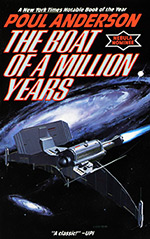
![]() BigEnk
BigEnk
5/15/2025
![]()
My biggest issue with The Boat of a Million Years lies with its structure. The meat of the novel, some 400 pages of it, are a series of historical fiction short stories that follow immortal humans as they progress through the ages of history. Some of these humans become consistent characters, but others appear for one chapter, or story, and are never mentioned again. This wouldn't be a problem on it's own, but is a symptom of the real problem to me, which is that there's simply not enough consistency or flow to get invested in these characters lives. The stories are interesting on their own, but don't really work well together as part of a larger novel, especially since there's no underlying plot to speak of that connects the stories. To make matters worse, many of these stories are repetitive, covering the same themes of loss and fragility (both of humans and civilization itself) from only slightly different perspectives. They tend to bleed together into a wash after awhile. Anderson is indulgent with the amount of time spent in this historical fiction section. It was also genuinely tiring for me to have to re-identify the major players, the period of history and the immediate setting every thirty pages or so. I was not allowed to settle into a narrative, and while that I can be a positive, I didn't feel that way about The Boat of a Million Years.
The last 100+ pages are a total shift from the rest of the novel, switching into a generation ship SF motif as the immortal humans, now disaffected by the increasingly inhuman Earth, venture out into space to find a place to recreate what they remembered of ancient times. This last section also has the most continuity, both for plot and character, of the entire book. However, because there's so little of it it feels at-odds with the rest of the work. Not only is the setting entirely different, but what Anderson writes about shifts as well, as he gets bogged down in technical specifics of the ship itself, and the complexities of long-term travel.
Then what did I like about it? Anderson is a good writer, and the prose itself was on the stronger side throughout the novel. I found myself touched by the way he describes the inner emotions of these immortal humans, and their fragility in spite of their strength to endure. I can't say that I was entirely drawn in during all five hundred pages, but the fact that I was able to pretty easily stick with it in spite of it's flaws is a testament to his ability to write a good story. The endings to several of the historical fiction chunks were especially well written and noteworthy. I also found the positive and not overly saccharine ending to be good in tone if not great in execution.
I just think it's too darn long for what it is: a well-written historical fiction novel with some science fiction stapled to the end that doesn't have a strong plot or purpose. I want to like it more than I do. It was sometimes chore to get through, especially the middle of the book when the short story formula was already overused.